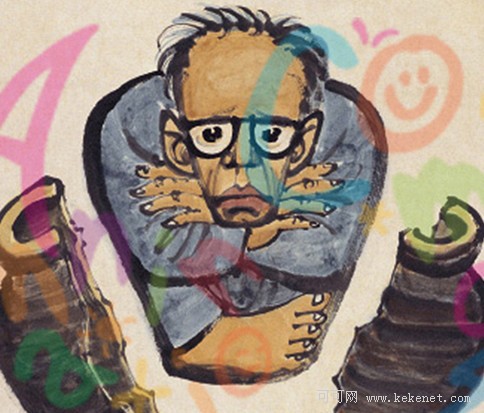
In these gloomy, uncertain times, the ability to have a good laugh — especially at your own expense — may be essential for survival. But are people really capable of having a sense of humor about themselves?
在低迷猶豫的時候,沒有什么能比具有開懷大笑的能力更能幫助人恢復元氣的了,特別是敢于自嘲的魄力。但人們真的能夠對于自己也充滿幽默么?
In the first-ever study of its kind, Ursula Beermann of the University of California, Berkeley, and Willibald Ruch of the University of Zurich studied 70 psychology students to gauge their ability to laugh at themselves. The findings support what has long been believed: that being able to laugh at oneself is not only a distinct trait, but is also linked with having an upbeat personality and good mood and may be the foundation for a good sense of humor.
在目前破天荒的首次相關研究中,美國加州大學的Ursula Beermann與蘇黎世大學的Willibald Ruch研究了70為心理學學生的子超能力。結果證實了長期以來的一種看法:能有自嘲的人不僅具有鮮明的個性品質,同時還有更加積極向上的心態,這都是使得他們具有良好幽默感的基礎條件。
Participants in the study were asked to rate their ability to see the humor in their own plight. They also designated one or two friends to rate them on the same characteristic.
參加這項測試的學生被要求對自己的逆境中所表現出來的幽默感進行評分,他們還指定了一到兩個朋友,并對他們在相同方面的個性進行評分。
While the students were filling out these questionnaires on a computer, its camera surreptitiously photographed their faces. The pictures were then altered using Mac Photo Booth software to make them look like distorted, funhouse-mirror images.
盡管學生們是通過電腦回答調查問卷的,但電腦的攝像頭同時記錄下了他們的遍布表情。圖像會經過軟件的加工,呈現出類似于游樂場哈哈鏡的效果。
Afterward, the study participants were asked to rate distorted photos of people they didn't know. Their own stretched-out images were randomly inserted into the sequence — and that's where the experiment really started. Participants were videotaped as they viewed the images to see whether they laughed or smiled at themselves. The videos were analyzed, using a well-studied rating system of emotional expression, to see how genuine the participants' expressions of humor were.
隨后,受測者們還被要求對于這些素不相識的人們的“哈哈鏡”照進行打分。他們自己的扭曲的圖像會被打亂之后隨即的插入,而這時實驗才真正的開始。攝像頭記錄下了他們在看到自己的圖像時會否開懷大笑或未向。然后,這段錄像會被通過一種專門研究情感表情的系統進行評級,以便研究受測者表情上所體現出的幽默感。
Eighty percent of participants genuinely smiled or laughed at least once when seeing their own silly image. However, those who claimed to have the ability to laugh at themselves — and whose friends' assessments matched their own — genuinely laughed and smiled more often and more intensely than the others.
有百分之八的受測者在看到自己滑稽的圖像時至少一次的微笑與大小。而這些被認為是有“敢笑”的魄力的人對于自己的評估,與他的朋友們的評價結果是基本吻合的,這種發自內心的笑會比其他人更加頻繁,更加的強烈。











